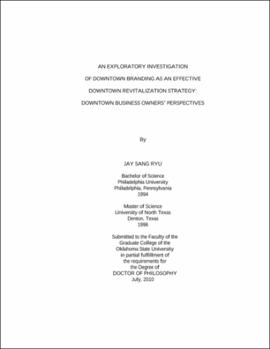| dc.contributor.advisor | Swinney, Jane | |
| dc.contributor.author | Ryu, Jay Sang | |
| dc.date.accessioned | 2013-11-26T08:23:23Z | |
| dc.date.available | 2013-11-26T08:23:23Z | |
| dc.date.issued | 2010-07 | |
| dc.identifier.uri | https://hdl.handle.net/11244/6707 | |
| dc.description.abstract | Scope and Method of Study: The viability of the downtown is closely related to the economic health of a community. Community administrators have explored various strategies to revitalize their downtowns, and a brand-oriented approach has emerged as an effective strategy to revive downtowns. The primary objective of this study is to investigate the impacts of downtown branding on the performance of downtowns and their businesses from the perspectives of downtown business owners. More specifically, this study aims to examine the casual relationships between downtown business owners' exposure to internal communication about downtown branding and their congruence with downtown branding; congruence with downtown branding and their commitment to the downtown; and commitment to the downtown and their perceived evaluations of the downtown performance; and perceived evaluation of the downtown performance and that of their own business performance. The data was collected from 167 downtown business owners from fifteen communities in a Midwestern state. A Structural Equation Modeling (SEM) technique was used to test cause-effect relationships in the proposed conceptual model. | |
| dc.description.abstract | Findings and Conclusions: Among proposed ten hypotheses, nine were found to be statistically significant. The first four hypotheses supported evidence that internal communication about downtown branding components - image, vision, culture, and positioning - improved downtown business owners' congruence with each component. The next set of hypotheses confirmed that downtown business owners' commitment to the downtown was driven by their congruence with downtown image, culture, and positioning. However, this study failed to establish that downtown vision increased business owners' commitment to the downtown. Results supported the relationship between commitment and the positive perception of downtown performance, as well as between the positive perception of the downtown performance and that of their own business performance. Findings suggested that "branding downtowns" may be an effective strategy to revitalize downtowns and to build a strong business environment for downtown businesses. | |
| dc.format | application/pdf | |
| dc.language | en_US | |
| dc.rights | Copyright is held by the author who has granted the Oklahoma State University Library the non-exclusive right to share this material in its institutional repository. Contact Digital Library Services at lib-dls@okstate.edu or 405-744-9161 for the permission policy on the use, reproduction or distribution of this material. | |
| dc.title | Exploratory investigation of downtown branding as an effective downtown revitalization strategy: Downtown business owners' perspectives | |
| dc.contributor.committeeMember | Muske, Glenn | |
| dc.contributor.committeeMember | Cho, Hira | |
| dc.contributor.committeeMember | Gavin, Mark | |
| osu.filename | Ryu_okstate_0664D_10950 | |
| osu.accesstype | Open Access | |
| dc.type.genre | Dissertation | |
| dc.type.material | Text | |
| dc.subject.keywords | brand congruence | |
| dc.subject.keywords | downtown branding | |
| dc.subject.keywords | downtown revitalization | |
| dc.subject.keywords | internal branding | |
| dc.subject.keywords | internal communication | |
| dc.subject.keywords | small bu | |
| thesis.degree.discipline | Human Environmental Sciences | |
| thesis.degree.grantor | Oklahoma State University | |
